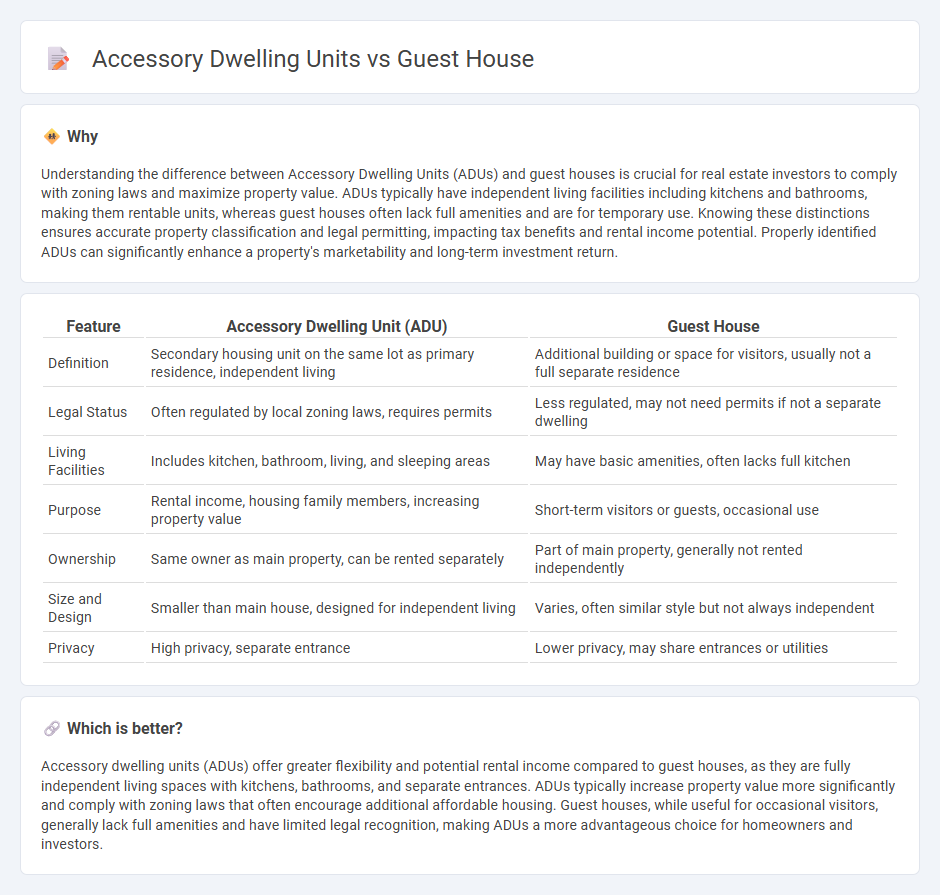
Accessory dwelling units (ADUs) are standalone living spaces on a residential property, often equipped with kitchens and bathrooms, designed to maximize property value and provide rental income. Guest houses are typically more basic, used for occasional visitors without full amenities or separate utilities. Explore the differences between ADUs and guest houses to make the best real estate decision for your property needs.
Why it is important
Understanding the difference between Accessory Dwelling Units (ADUs) and guest houses is crucial for real estate investors to comply with zoning laws and maximize property value. ADUs typically have independent living facilities including kitchens and bathrooms, making them rentable units, whereas guest houses often lack full amenities and are for temporary use. Knowing these distinctions ensures accurate property classification and legal permitting, impacting tax benefits and rental income potential. Properly identified ADUs can significantly enhance a property's marketability and long-term investment return.
Comparison Table
| Feature | Accessory Dwelling Unit (ADU) | Guest House |
|---|---|---|
| Definition | Secondary housing unit on the same lot as primary residence, independent living | Additional building or space for visitors, usually not a full separate residence |
| Legal Status | Often regulated by local zoning laws, requires permits | Less regulated, may not need permits if not a separate dwelling |
| Living Facilities | Includes kitchen, bathroom, living, and sleeping areas | May have basic amenities, often lacks full kitchen |
| Purpose | Rental income, housing family members, increasing property value | Short-term visitors or guests, occasional use |
| Ownership | Same owner as main property, can be rented separately | Part of main property, generally not rented independently |
| Size and Design | Smaller than main house, designed for independent living | Varies, often similar style but not always independent |
| Privacy | High privacy, separate entrance | Lower privacy, may share entrances or utilities |
Which is better?
Accessory dwelling units (ADUs) offer greater flexibility and potential rental income compared to guest houses, as they are fully independent living spaces with kitchens, bathrooms, and separate entrances. ADUs typically increase property value more significantly and comply with zoning laws that often encourage additional affordable housing. Guest houses, while useful for occasional visitors, generally lack full amenities and have limited legal recognition, making ADUs a more advantageous choice for homeowners and investors.
Connection
Accessory dwelling units (ADUs) and guest houses are connected as both serve as secondary living spaces on a single residential property, providing additional housing options without requiring subdivision of the land. ADUs are often designed with independent facilities like kitchens and bathrooms, enabling long-term living or rental opportunities, while guest houses typically offer temporary accommodation for visitors. Both structures contribute to increased property value and flexible residential use, supporting urban density and housing affordability goals.
Key Terms
Zoning Regulations
Zoning regulations distinctly impact guest houses and accessory dwelling units (ADUs), often defining acceptable sizes, occupancy limits, and usage purposes. Guest houses are typically restricted to non-rental, temporary accommodations for visitors, while ADUs frequently permit independent living with full kitchen and bathroom facilities under local ordinances. Explore detailed zoning codes to understand compliance, permitted modifications, and potential benefits for your property development.
Occupancy Restrictions
Occupancy restrictions for guest houses typically limit them to short-term stays or temporary use by visitors, often regulated by local zoning laws and homeowner association rules. Accessory dwelling units (ADUs), however, are designed for more permanent occupancy, allowing full-time residents such as family members or tenants, subject to distinct municipal occupancy and rental regulations. Explore local housing codes to understand detailed occupancy rules for both guest houses and ADUs.
Property Value Impact
Guest houses and accessory dwelling units (ADUs) both enhance property value by providing additional living space and rental income potential. ADUs typically offer greater market appeal due to their fully equipped kitchens and separate entrances, making them more versatile for long-term tenants or multigenerational families. Explore the differences in property value impact between guest houses and ADUs to optimize your real estate investment strategy.
Source and External Links
Guest House of Milwaukee - Provides shelter, housing, education, and services to Milwaukee's homeless population.
The Guest House - Austin - A contemporary dining destination in downtown Austin, offering modern twists on classic dishes.
Guest House - Offers recovery services for clergy and religious individuals struggling with addiction.
 dowidth.com
dowidth.com